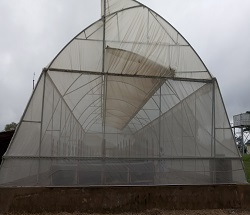The National Biotechnology Development Agency (NABDA) says it plans to industrialise yam production in the country to ensure food security, boost job creation and the reposition the economy.
SEE ALSO: Fostering jobs, entrepreneurship, and capacity development for African youth
NABDA Director-General, Prof. Alex Akpa, said this in an interview with the News Agency of Nigeria (NAN) after a tour of yam seed production facilities at the agency in Abuja on Wednesday.
Akpa said that the plans will be achieved through the use of Yam Aeroponics System, a state-of-the-art green house, for the production and multiplication of yam seedlings, in partnership with Biocrops Technology Company.
He said the tour was to assess the progress of work done by Biocrops on the seeds production.
The director-general said that COVID-19 had taught the country a valuable lesson in self-reliance and the need to seek home grown solutions to challenges.
He pointed out that the production and multiplication of the initial 5 million yam seedlings have been stepped up to 100 million seedlings in order to create new opportunities in the economy.
Dr Joseph Odusanya, Chief Executive Officer (CEO) Biocrops Technology, represented by Mr Odusanya Shola, said the collaboration was the result of Federal Government’s programme on focused laboratories.
He said that there were lots of opportunities that would be available with the production of yams in million quantities for industrialisation.
“We will then begin to add generation of farms in tens of hectares whereby you can hardly find a yam farm in Nigeria today that is 20 hectares.
“ We want to change that fortune to such that we can have yam farms that are 100 to 300 acres, producing on a large scale.
“ We would then begin to use yam the way developed countries use wheat to produce confectionaries, pharmaceuticals products and also to generate energy,’’ he said.
In the area of job creation, the CEO said, new job opportunities would be opened for culturists to culture yam and there would be opportunities also for seed producers.
Odusanya said presently, there were no individuals in Nigeria whose job was to create yam seeds, but that such opportunities would exist through creation of new jobs.
“We want to create those new jobs for people that want to be packaging yams in different forms as seeds, ware or dried yams,” he said.
Odusanya assured that as a result of this, there would be availability of raw materials such that industrialists would set up industries, thereby engaging millions of people for supplies to factories in Nigeria.
He said there would be exporters of finished products and accordingly, export of yams as tubers among others.
During the tour, Odusanya illustrated how the yam seedlings in the aeroponics production system worked.
According to him, in the aeroponics system, air is mixed with water while the yam is suspended in the air and does not have contact with soil, thereby keeping the yam clean and disease free.
Odusanya said the yams came straight from laboratories without diseases, and when planted; provide better yield than normal yams which had acquired diseases from field applications.
He also said that the system would enable the production of up to 20 hectares of yam seedlings within a planting season.
Chief James Awoniyi, a Director in Biocrops Technology firm, said that what they were doing in NABDA was the production of yam from the vine and not using yam to produce yam.
`’We are talking of millions of seedlings within six months which can never happen using yam to produce yam and our challenge is to turn yam economy to bringing it into our natural psyche.
“The yam economy is twice larger than rice, maize, sorghum, millet and cassava economy put together,’’ he said.
Awoniyi also said Nigerians only produce yam for feeding whereas its industrial application was ten times higher than just to eat.
According to him, talking about industrialisation of yam production is to talk about yam in the pharmaceutical industry as tablets leading to massive employment.

